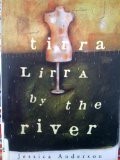Tirra Lirra by the River by Jessica Anderson
Tirra Lirra by the River by Jessica Anderson won the Miles Franklin Award in 1978. This prize is awarded annually for the best novel (of high literary merit) presenting Australian life. Miles Franklin, whose best known novel was My Brilliant Career, made a bequest in her will to establish the prize which was first awarded in 1957.
As an Australian, I particularly enjoy reading novels set in Australia. While the characters in Australian novels are not as familiar to me as my own immediate family, they often remind me of my aunts and uncles or cousins. Familiar locations might make me feel nostalgic or give me a sense of belonging. Most of the novels I read are by American or English authors and while I enjoy the feeling of a trip somewhere while I am reading a novel, there is no place like home (remember how Dorothy felt while she was in Oz?)
I found the character’s names in Tirra Lirra by the River to be particularly evocative of the time and place the novel was set in. Growing up in the 1970’s in country Victoria, there were plenty of Noras, Dorothys, Bettys, Jacks and Freds, albeit of an older generation, in my community. From Jessica’s Anderson’s description of the country town in Queensland where this book was set, I could almost picture the street and the houses, smell the trees and dust, and hear the birds and other sounds which are so distinctively Australian.
Tirra Lirra by the River is the story of Nora Porteous’s life, following her return to the house she grew up in after almost a lifetime in London. Nora falls ill immediately on her return and is bedridden. While confined to bed, she has plenty of time to reflect on her childhood, family, friends and her failed marriage. From the neighbours who care for her, Nora learns a great deal more than she realised earlier about the community she grew up in. Nora’s suppressed memories flood in and eventually she comes to understand herself and her motives better than ever.
Very early in the novel the reader learns that Nora believes that she and her mother had little in common and that they didn’t like each other very much. Nora says, “it happens more often than is admitted,” something which is rarely seen in print, apart from the obvious example of when there is a psychopath in the family, such as We Need to Talk About Kevin by Lionel Shriver. In stories about ‘ordinary’ families the only examples of parents and children disliking each other I can think of is temporary, that of battles between parents and teenaged children, and even then it is understood that with the passing of time, friendship, love and harmony will be restored. I agree with the author that parents and children in real life don’t always like each other, but it still shocked me to see this particular truth in print, especially for a novel of this time when so much emphasis was on putting on a good show for the neighbours.
Nora is artistic. Her friends are a very bohemian group, but she marries a miserly mother’s boy, who eventually leaves her for another woman. He was no great loss to Nora, who took the opportunity to leave Australia for London with a thousand pounds from his savings in her pocket.
Nora has a shipboard romance, followed by an abortion, then a stint as a student which led to a career as a dressmaker. After WW2, life was London hard. Nora moved in with friends to save costs, but eventually decided to give up London and return to Australia, to her family home in Queensland. By this time Nora’s hands were arthritic and her career over. Nora resented her sister Grace for making the arrangements for the house to be kept for Nora’s use during her lifetime, but even though Nora believed Grace was still trying to boss her around from the grave, the use of the house was also a blessing, as Nora was so poor she would otherwise have been homeless.
While the novel came full circle in terms of place, and Nora reached a better understanding of her family and friends, the story also felt unresolved. Nora always seemed to be wanting something, I can’t put my finger on what exactly, which she did not achieve. Despite this, I enjoyed Tirra Lirra by the River and think the book a worthy recipient of the Miles Franklin Award.

Recent Comments